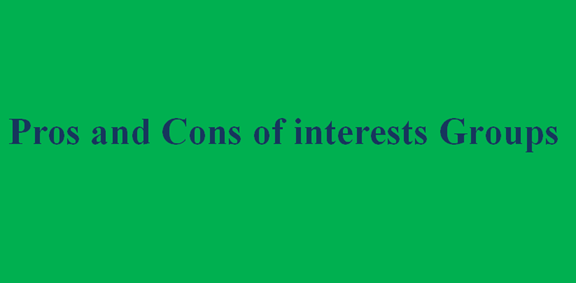We have all seen many individual organizations that are formally organized towards a special interest. These are what we refer to as interest groups. The groups can be based on one or combined interests or concerns which are aimed at influencing political policy in favor of their concerns. Their goal could be exclusively a policy that benefits their group members or one segment of the society or a policy that advances a broader public purpose. They attempt to achieve their goals by lobbying on policymakers to gain policy outcomes in their favor. They play an important role in the development of political and social systems.
Pros:
1. They use a democratic process- they contribute a helpful democratic process to protect certain individuals in intimidating the preponderance. All the members of the group have a way of expressing and speaking their minds.
2. They have the ability to motivate legislators- these groups can easily motivate legislators into promulgating their beliefs optimistically.
3. They check the powers of the majorities-Those on gender, religion and ethnic will always check on the powers of the majority.
4. They allow for better representation of interests- The members on interest groups know better what it means to protect what they stand for whether civil rights, voting rights or even wildlife and environment.
5. They provide positive solutions- with their skills and knowledge, these groups can provide positive solutions to problems faced by political departments.
6. They serve as an avenue for political involvement- interest groups serve as an avenue for political involvement and action for the larger community. Providing enough and reliable information to their members.
7. They ensure an outspread dispersal of expenses-They usually seek immunity from the government through their activities such as marches, professional lobbying, and petitions.
Though, the costs are borne by the members.
8. It creates a system that is inherently fair- Everyone in the group and the community has an equal share of benefits of interests. They also have equal rights to have their ideas heard and taken seriously.
9. The governing process has balance because they always check- majority rule may be the primary governing influence to most governments, and interest groups allow this to be maintained, while also allowing the minorities to advocate for their ethnic, religious or cultural preferences.
10. They fight for what people cannot fight for-Sometimes mobilizing people to fight for their rights can be daunting, however, in this case, these groups will fight for what one individual cannot fight for.
Cons:
1. It advocates for minority over the majority- in most cases the purpose of an interest group is to advocate for the minority over the majority.
2. It focuses on one sole subject or classification- interest groups are generally focused on one subject only.
3. It does not usually end fairly- interest groups may help in creating an equitable playing field, yet some groups tend to have more leverage than the others. This occurs when some groups are supported by people that have more resource access than the other group.
4. The interests of the society are not always advocated- Some of the interest groups can be misleading especially those formed with corporate money. These corporate groups will fight for the best interests of the business sponsoring them.
5. It can cause political jam- as a general rule of the thumb; the loudest voice typically wins an argument when the interest groups are caught up in a conversation. Their moves can actually affect the political outcome.
6. It is not based on an elective process- many of the leaders of the interest groups are nominated to their positions. Some even occupy high-level positions because they founded the group.
7. It harms the many to help the few- Many of these interest groups only focus on their issue at hand which means the whole idea can harm many.
8. It has a history that involves unethical conduct- These groups are marked with historical acts of bribery and many other forms of corruption.
9. It can lead to improper governing systems– Interest groups are so powerful that they can be able to influence governance. This comes in as one of the worst things to do for a government trusted by people.
10. Waste of money for non-profitable actions- The many instances when these groups fight for issues that are not in the interest of the majority leads to a waste of money and other resources.



